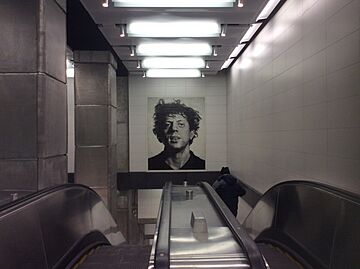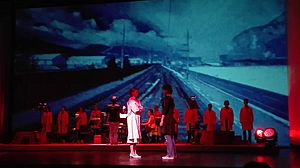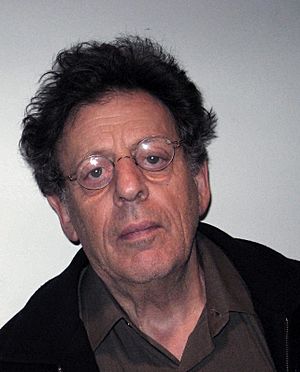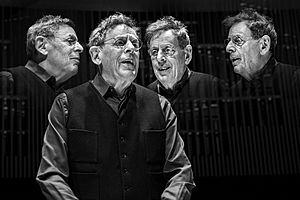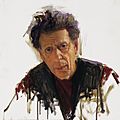Philip Glass facts for kids
Quick facts for kids
Philip Glass
|
|
|---|---|
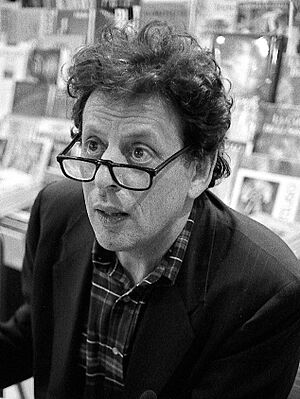
Glass in 1993
|
|
| Born | January 31, 1937 |
| Occupation | Composer |
| Organization | Philip Glass Ensemble |
| Known for | Minimal music |
|
Works
|
List of compositions |
Philip Glass (born January 31, 1937) is an American composer and pianist. He is known as one of the most important composers of the late 1900s. Glass's music is often called minimal music. This means it uses small, repeating musical ideas that change slowly over time. He himself called his work "music with repetitive structures." He helped this style of music grow and change.
Glass started the Philip Glass Ensemble in 1968. He has written many different kinds of music. This includes 15 operas, many smaller operas and musical theatre shows. He also composed 14 symphonies, 12 concertos, and nine string quartets. Besides these, he wrote lots of other chamber music and many film scores.
He has been nominated for four Grammy Awards. These include nominations for his opera Satyagraha (1987) and String Quartet No. 2 (1988). He also received three Academy Award for Best Original Score nominations for movies. These were for Martin Scorsese's Kundun (1997), Stephen Daldry's The Hours (2002), and Richard Eyre's Notes on a Scandal (2006). Other famous film scores he created include Mishima: A Life in Four Chapters (1985) and The Truman Show (1998).
Glass is famous for operas like Einstein on the Beach (1976), Satyagraha (1980), and Akhnaten (1983). He also wrote music for Broadway plays. For example, he worked on The Elephant Man (2002) and The Crucible (2016). He won a Drama Desk Award for Outstanding Music in a Play for King Lear (2019).
Glass has received many honors. These include a BAFTA Award, a Drama Desk Award, and a Golden Globe Award. He was also nominated for three Academy Awards, four Grammy Awards, and a Primetime Emmy Award. He received the Ordre des Arts et des Lettres from France in 1995. In 2010, he got the National Medal of Arts. He was honored at the Kennedy Center Honors in 2018. In 2020, he received the Grammy Trustees Award. In 2025, he received a Lifetime Achievement award.
Contents
Early Life and Learning Music
Glass was born in Baltimore, Maryland, on January 31, 1937. His parents were Ida and Benjamin Charles Glass. His family came from Latvia and Russia and were Jewish. His father owned a record store, and his mother was a librarian.
Glass learned to love music from his father. He later found out that many people on his father's side of the family were musicians. His cousin Cevia was a classical pianist. His father's store often got new records for free. Glass spent many hours listening to these, which helped him learn about different kinds of music. He was open to new sounds from a young age.
His father sold many types of music, including modern classical music. Glass built a large record collection from the unsold records. This included music by composers like Hindemith, Bartók, and Shostakovich. He also listened to Western classical music, like Beethoven's string quartets. Glass says that Franz Schubert was a "big influence" on him.
He learned to play the flute as a child. He studied at the Peabody Preparatory of the Peabody Institute of Music. When he was 15, he joined a special college program at the University of Chicago. There, he studied math and philosophy. In Chicago, he learned about the serialism of Anton Webern. He even wrote a twelve-tone string trio. In 1954, Glass went to Paris. He was very impressed by the films of Jean Cocteau. He also visited artists' studios and saw their work.
Glass later studied at the Juilliard School of Music. His main instrument was the keyboard. His teachers included Vincent Persichetti. Other students there included Steve Reich. In 1959, he won a prize for young composers called the BMI Student Composer Awards. In 1960, he studied with Darius Milhaud at the Aspen Music Festival. After Juilliard in 1962, Glass moved to Pittsburgh. He worked as a composer in public schools, writing music for choirs, small groups, and orchestras.
Music Career
Studying in Paris (1964–1966)
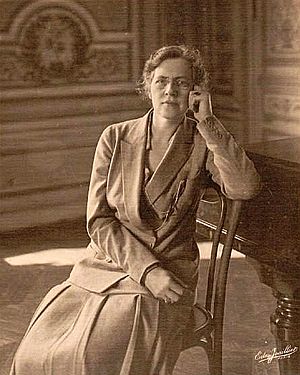
In 1964, Glass received a Fulbright Scholarship. He used it to study in Paris with the famous music teacher Nadia Boulanger. This time, from 1964 to 1966, greatly influenced his music. Glass said that the composers he studied with Boulanger, like Bach and Mozart, were still important to him later on.
Glass felt that much of the new music in Paris was not exciting. But he was very impressed by new films and theater. He moved away from the style of composers like Pierre Boulez. He felt there was no point in trying to do their music better than them. So, he decided to try something new.
During this time, he saw new films from the French New Wave. He also became friends with American artists, actors, and directors. With his wife at the time, JoAnne Akalaitis, he saw many theater performances. These experiences led to him writing music for a play by Samuel Beckett called Play in 1965. This piece, for two soprano saxophones, was influenced by the play's repeating structure. It was one of his first pieces in a minimalist style.
In 1965 and 1966, Glass also worked on a film score with Ravi Shankar and Alla Rakha. This was another important influence on his music. His unique style came from working with Shankar and Rakha. He learned about rhythm in Indian music, which is built up by adding small parts together. After this, he stopped writing music in his older style. He began writing pieces based on the repeating structures of Indian music. He also used a sense of time influenced by Samuel Beckett.
In 1966, Glass left Paris and traveled to northern India. There, he met Tibetan refugees and became interested in Buddhism. He met the 14th Dalai Lama in 1972. Since then, he has strongly supported the Tibetan independence movement.
Minimalism and New York (1967–1974)
When Glass arrived in New York City in 1967, he saw a performance by Steve Reich. This deeply impressed him. He then made his music style even simpler. He formed a group with other musicians, including Jon Gibson. They started performing in art galleries and studios in SoHo. Artist Richard Serra helped Glass find places to perform. From 1971 to 1974, Glass also worked as Serra's assistant.
Between 1967 and 1968, Glass wrote nine new pieces. These included Strung Out for violin and Music in the Shape of a Square for two flutes. These pieces were designed to explore his new minimalist ideas. His first concert of this new music was in September 1968. The audience, mostly artists, loved his simple approach.
Besides his music, Glass also worked other jobs. He had a moving company with his cousin. He also worked as a plumber and a cab driver from 1973 to 1978. He became friends with other New York artists like Sol LeWitt and Chuck Close. Glass later wrote a piece called A Musical Portrait of Chuck Close for piano.
Glass's music became more complex over time. Pieces like Music in Similar Motion (1969) and Music with Changing Parts (1970) showed this. His group, the Philip Glass Ensemble, performed these works. Critics sometimes reacted negatively, but younger artists like Brian Eno and David Bowie were excited by his music. Eno called it "one of the most extraordinary musical experiences of [his] life." In 1970, Glass returned to theater, writing music for the group Mabou Mines.
After some disagreements with Steve Reich in 1971, Glass formed his own Philip Glass Ensemble. This group used keyboards, wind instruments, and voices. Glass's music for his ensemble reached a high point with the four-hour-long Music in Twelve Parts (1971–1974). This piece started as one work but grew into a cycle that showed all of Glass's musical ideas since 1967. Glass said he had "broken the rules of modernism and so I thought it was time to break some of my own rules." He now prefers to call himself a composer of "music with repetitive structures."
The Portrait Trilogy (1975–1979)
Glass continued his work with a series of instrumental pieces called Another Look at Harmony (1975–1977). For Glass, this series was a new beginning. He wanted to combine his rhythmic structures with harmonic progressions to create new overall structures.
Parts of Another Look at Harmony were used in his first opera, Einstein on the Beach. He created this opera in 1975 with director Robert Wilson. It premiered in 1976 in France and then in New York City. The opera was about Albert Einstein, a scientist and musician. It used the Philip Glass Ensemble, a solo violin, and a chorus. It also had actors speaking texts. The opera was praised as "one of the seminal artworks of the century."
After Einstein on the Beach, Glass wrote more music for the theater group Mabou Mines. He also wrote music for films and TV. For example, he composed North Star (1977) for a documentary. He also wrote four short pieces for the children's TV show Sesame Street called Geometry of Circles (1979).
Another series of works, Fourth Series (1977–79), included music for chorus and organ. Some of these pieces were used in dance shows by choreographer Lucinda Childs. One piece, "Part Four," was renamed Mad Rush. Glass performed it when the 14th Dalai Lama first appeared publicly in New York City in 1981. This piece showed Glass moving towards more traditional music forms.
In 1978, Glass received a commission from the Netherlands Opera. This meant he no longer needed other jobs to make money. He continued his work in music theater with his opera Satyagraha. It premiered in 1980 and was based on the early life of Mahatma Gandhi in South Africa. For this opera, Glass worked with writer Constance deJong. This was his first work since 1963 that used a full symphony orchestra. Soon after, Glass met conductor Dennis Russell Davies. They began planning another opera together.
Finishing the Portrait Trilogy (1980–1986)
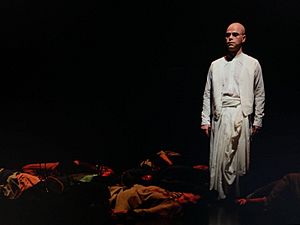
While planning the third part of his "Portrait Trilogy," Glass worked on smaller music theater projects. These included Madrigal Opera (1980) and The Photographer (1982), which was about photographer Eadweard Muybridge. Glass also continued to write for orchestras. He composed the score for the film Koyaanisqatsi (1981–1982). Some music from this film was released on the album Glassworks (1982). This album helped Glass's music reach more people.
The "Portrait Trilogy" was completed with Akhnaten (1982–1983). This opera premiered in 1984. It was sung in ancient languages like Akkadian and Ancient Egyptian. An actor also recited ancient Egyptian texts in the audience's language. Akhnaten was special because Glass decided to remove the violins from the orchestra. This gave the music a "low, dark sound" that fit the story well. Glass said Akhnaten was important because it explored new harmonic ideas.
Glass worked with Robert Wilson again on another opera, the CIVIL warS (1983). This opera was part of a larger work planned for the Olympic Games in Los Angeles. It included Latin texts and references to music from the American Civil War.
In the mid-1980s, Glass created many works very quickly. These included music for dance, like Glass Pieces (1983) for the New York City Ballet. He also wrote music for plays, such as Endgame (1984) and Company (1983). Company was a short, personal piece for string quartet. Glass first thought of it as "music for use," like "salt and pepper." But it became known as Glass's String Quartet No. 2. It was performed by groups like the Kronos Quartet.
This interest in string quartets led to a film score for Mishima: A Life in Four Chapters (Paul Schrader, 1984–85). Glass recently called this his "musical turning point" for film scoring.
Glass also wrote vocal works. These included Three Songs for chorus (1984) and a song cycle called Songs from Liquid Days (1985). For Songs from Liquid Days, he worked with songwriters like David Byrne and Paul Simon. The Kronos Quartet also played a big part in this album. Glass continued his opera series with adaptations of books. These included The Juniper Tree (1984) and Edgar Allan Poe's The Fall of the House of Usher (1987). He also worked with novelist Doris Lessing on the opera The Making of the Representative for Planet 8 (1985–86).
Operas and Symphonic Music (1987–1991)
Pieces like Company and Facades led Glass to write more music for string quartets and symphony orchestras. His chamber and orchestral works became more traditional and melodic. In these pieces, Glass often used old musical forms like the chaconne. Examples include his Violin Concerto No. 1 (1987) and Symphony No. 3 (1995).
He started a series of orchestral works for the concert hall with the Violin Concerto No. 1 (1987). This piece was written for violinist Paul Zukofsky and conductor Dennis Russell Davies. Glass dedicated it to his father, who loved violin concertos. The Concerto was later recorded by Gidon Kremer and the Vienna Philharmonic. Glass continued writing orchestral music with a trilogy of "portraits of nature." These were The Light (1987), The Canyon (1988), and Itaipu (1989).
While composing for orchestras, Glass also wrote piano music. This included the five-movement cycle Metamorphosis. He also wrote music for the Errol Morris film The Thin Blue Line (1988). In the same year, Glass met poet Allen Ginsberg. They decided to work together and chose Ginsberg's poem Wichita Vortex Sutra. This became a piece for a speaker and piano, and then a music theater piece called Hydrogen Jukebox (1990).
Glass also returned to chamber music. He composed two more String Quartets (No. 4 Buczak in 1989 and No. 5 in 1991). He also wrote chamber works that started as music for plays. One example is Music from "The Screens" (1989/1990). This work was a collaboration with Gambian musician Foday Musa Suso. Glass had already worked with Suso on the film score for Powaqqatsi (1988). Another collaboration was a recording project with Ravi Shankar, which resulted in the album Passages (1990).
In the late 1980s and early 1990s, Glass received two important opera commissions. These were about explorers. The Voyage (1992) was for the Metropolitan Opera. It celebrated 500 years since Christopher Columbus discovered America. White Raven (1991) was about Vasco da Gama. It was a collaboration with Robert Wilson. In The Voyage, Glass explored new musical ideas, with a "newly arching lyricism" and a "dark, brooding tone."
Cocteau Trilogy and Symphonies (1991–1996)
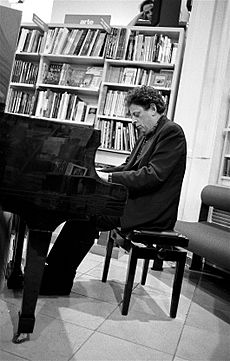
After these operas, Glass began a series of symphonies. Conductor Dennis Russell Davies encouraged him to write them. Glass responded with two three-movement symphonies: "Low" (1992) and Symphony No. 2 (1994). His first symphony used his own music combined with themes from the David Bowie/Brian Eno album Low. Symphony No. 2 explored polytonality, which means using more than one musical key at the same time.
With pieces like the Concerto Grosso (1992) and Symphony No. 3 (1995), Glass developed a clearer and more delicate chamber-orchestral style. In his Third Symphony, Glass treated a 19-piece string orchestra like a large chamber group. This symphony is considered one of his "most tightly unified works." His Fourth Symphony, Heroes (1996), was based on themes from another Bowie-Eno album, "Heroes". It also exists in two versions: one for concerts and a shorter one for dance.
Another project was a second series of piano pieces, the Etudes for Piano. Glass himself recorded and performed the first ten Etudes. These pieces explore different sounds, from Baroque-like passages to more Romantic moods. Some of these Etudes also appeared in other versions, like in the theater music for Robert Wilson's Persephone (1994).
Glass's many works in the 1990s also included an opera triptych (three related works) from 1991–1996. He called this an "homage" to writer and film director Jean Cocteau. The operas were based on Cocteau's works: Orphée (1950 film), La Belle et la Bête (1946 film), and the novel Les Enfants terribles (1929). The triptych also honored French composers connected to Cocteau, like Les Six, and 18th-century composers like Gluck and Bach.
The first part, Orphée (1991), was inspired by Gluck's opera Orfeo ed Euridice. This opera was important in Cocteau's 1949 film. The opera's theme of death had some connection to Glass's own life. His wife, artist Candy Jernigan, had died unexpectedly in 1991. Critics praised the opera's clear sound and expressive singing.
For the second opera, La Belle et la Bête (1994), Glass replaced the original film music. He wrote a new opera score and made it play exactly with Cocteau's film. This was a new way to combine film and opera. The last part of the triptych was the "Dance Opera" Les Enfants terribles (1996). It was written for voices, three pianos, and dancers. The music for this opera reminded Glass of Bach's harpsichord concertos.
Symphonies, Operas, and Concertos (1997–2004)
In the late 1990s and early 2000s, Glass's lyrical and romantic style became very strong. He worked on many projects: operas, theater, and film scores. These included Martin Scorsese's Kundun (1997) and Stephen Daldry's The Hours (2002). He also wrote a series of five concertos and three symphonies. Two symphonies, Symphony No. 5 "Choral" (1999) and Symphony No. 7 "Toltec" (2004), had a meditative theme. The opera-like Symphony No. 6 Plutonian Ode (2002) was based on a poem by Allen Ginsberg.
Glass continued his opera series by adapting literary texts. These included The Marriages of Zones 3, 4 and 5 (1997) by Doris Lessing. He also wrote In the Penal Colony (2000), based on a story by Franz Kafka. The chamber opera The Sound of a Voice (2003) featured the Pipa, a Chinese instrument. Glass also worked with Robert Wilson again on Monsters of Grace (1998). He created an opera about the astronomer Galileo Galilei (2001).
In the early 2000s, Glass started a series of five concertos. These included the Tirol Concerto for Piano and Orchestra (2000) and the Concerto Fantasy for Two Timpanists and Orchestra (2000). The Concerto for Cello and Orchestra (2001) premiered in Beijing. These were followed by the clear and Baroque-like Concerto for Harpsichord and Orchestra (2002). Two years later, he wrote Piano Concerto No. 2: After Lewis and Clark (2004). This concerto celebrated the pioneers' journey across North America. The second movement featured a duet for piano and Native American flute.
Recent Works (2005–Present)
Waiting for the Barbarians, an opera based on a novel, premiered in September 2005. Glass called it a "social/political opera." He said it was a discussion about political problems. The music for this opera was simple and traditional.
In November 2005, Glass's Symphony No. 8 premiered in New York City. This piece was purely orchestral. Critics noted its changing themes and "unpredictable orchestration." Alex Ross said it added "something certifiably new to the overstuffed annals of the classical symphony."
The Passion of Ramakrishna (2006) was a choral work based on the writings of an Indian spiritual leader. Critics said it inspired Glass to write something fresh. A cello suite, Songs and Poems for Solo Cello (2005–2007), was also highly praised. It was described as "deeply Romantic in spirit, and at the same time deeply Baroque."
In 2007, Glass worked with Leonard Cohen on a piece based on Cohen's poetry collection Book of Longing. This work, for seven instruments and a vocal quartet, included Cohen's spoken word recordings.
Appomattox, an opera about the end of the American Civil War, premiered in October 2007. Glass worked with writer Christopher Hampton on this. Conductor Dennis Russell Davies noted that Glass's recent operas used more melodic elements in the low instruments. Glass also wrote music for a collection of Samuel Beckett's short plays in 2007.
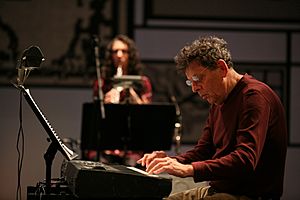
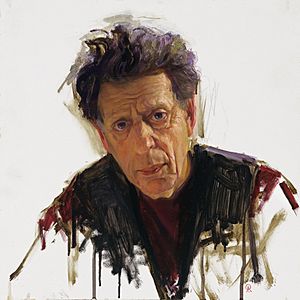
Between 2008 and 2010, Glass continued to write chamber music. This included Four Movements for Two Pianos (2008) and a Sonata for Violin and Piano (2008). A String sextet (2009) was an adaptation of his Symphony No. 3. Other recent pieces include Pendulum (2010) for violin and piano, and a second Cello Suite (2011).
Other theater works included music for Euripides' The Bacchae (2009). He also wrote Kepler (2009), another opera about a scientist. This opera was about the astronomer Johannes Kepler. It was Glass's first opera in German. Critics described it as "most chromatic, complex, psychological score."
In 2009 and 2010, Glass returned to writing concertos. Violin Concerto No. 2 (2009) was called "The American Four Seasons." It was a tribute to Vivaldi's The Four Seasons. The Double Concerto for Violin and Cello and Orchestra (2010) was also a ballet score. Glass also wrote short orchestral scores for films, like Nosso Lar (2010). He also contributed a short work, Brazil, to the video game Chime (2010).
In August 2011, Glass presented a series of music, dance, and theater performances. These included the Philip Glass Ensemble and a screening of Dracula with Glass's score.
Other works since 2010 include Symphony No. 9 (2010–2011) and Symphony No. 10 (2012). His Ninth Symphony premiered on January 1, 2012, in Austria. The American premiere was on his 75th birthday, January 31, 2012. His Tenth Symphony premiered in France in August 2012.
The opera The Perfect American (2011) was about the last months of Walt Disney's life. It premiered in Madrid in January 2013. His opera The Lost (2013) was based on a play by Peter Handke.
In May 2015, Glass's Double Concerto for Two Pianos premiered. His memoir, Words Without Music, was published in 2015. His 11th symphony premiered on his 80th birthday, January 31, 2017. His Piano Concerto No. 3 premiered in September 2017. Glass's String Quartet No. 8 premiered in February 2018.
Glass's 12th symphony premiered in Los Angeles in January 2019. It was based on David Bowie's 1979 album Lodger. This symphony completed Glass's trilogy of symphonies based on Bowie's Berlin Trilogy albums.
During the COVID-19 pandemic, Glass continued composing. Three major works premiered in 2021 and 2022. His opera Circus Days and Nights premiered in May 2021. Glass's Symphony No. 14 premiered in London in September 2021. His Symphony No. 13 premiered in Toronto in March 2022. It was a tribute to Canadian journalist Peter Jennings.
In November 2023, Glass and Artisan Books released a special boxed set of his piano etudes and essays.
Influences and Working with Others
Glass calls himself a "classicist." He learned harmony and counterpoint and studied composers like Franz Schubert, Johann Sebastian Bach, and Wolfgang Amadeus Mozart. The music of Jean Sibelius also influenced his lyrical and strong style. Besides classical music, his work is connected to rock, ambient music, electronic music, and world music.
Early fans of his minimalist style included musicians Brian Eno and David Bowie. In the 1990s, Glass wrote symphonies like Low (1992) and Heroes (1996). These were based on Bowie and Eno's albums.
Glass has worked with many recording artists. These include Paul Simon, Suzanne Vega, Leonard Cohen, and David Byrne. He also collaborated with Aphex Twin. Glass's music has influenced other musicians like Mike Oldfield and bands like Tangerine Dream. Glass also helped produce music for the American band Polyrock.
Glass has many friends and collaborators who are artists. These include visual artists like Richard Serra and Chuck Close. He has worked with writers like Doris Lessing and Allen Ginsberg. He also collaborated with film and theater directors like Errol Morris and Robert Wilson. His musical collaborators include Ravi Shankar, Dennis Russell Davies, and Laurie Anderson.
Glass started using the Farfisa portable organ because it was easy to use. It can be heard on several of his recordings.
Music for Films
Glass has composed many film scores. He started with the orchestral score for Koyaanisqatsi (1982). He also scored two movies about famous people: Mishima: A Life in Four Chapters (1985) and Kundun (1997), about the Dalai Lama. He received his first Academy Award nomination for Kundun. In 1968, he composed music for a short film called Railroaded.
After scoring Hamburger Hill (1987), Glass began working with filmmaker Errol Morris. He composed music for Morris's documentaries, including The Thin Blue Line (1988). He continued to score the Qatsi trilogy films: Powaqqatsi (1988) and Naqoyqatsi (2002). In 1998, he made a brief appearance playing piano in Peter Weir's The Truman Show. This film used music from his previous works and some new tracks. In the 1990s, he also scored Bent (1997) and the horror film Candyman (1992).
In 1999, he created a new soundtrack for the 1931 film Dracula. The Hours (2002) earned him a second Academy Award nomination. The repeating nature of Glass's music in this film helped connect different parts of the story. Director Stephen Daldry felt Glass's music was like "another character" in the film. This was followed by another Morris documentary, The Fog of War (2003). In the mid-2000s, Glass scored films like Secret Window (2004) and The Illusionist. He received his third Academy Award nomination for Notes on a Scandal. His recent film scores include No Reservations (2007) and Fantastic Four (2015). In 2009, Glass composed music for Transcendent Man, a documentary about Ray Kurzweil.
In the 2000s, Glass's older music became popular again through various media. In 2005, his Concerto for Violin and Orchestra (1987) was used in the French film The Moustache. Metamorphosis: Metamorphosis One (1989) was featured in the TV show Battlestar Galactica and Person of Interest. In 2008, Grand Theft Auto IV used Glass's "Pruit Igoe" from Koyaanisqatsi. "Pruit Igoe" and "Prophecies" were also used in the film Watchmen. In 2013, Glass contributed a piano piece "Duet" to the film Stoker. In 2017, Glass scored the documentary Jane about Jane Goodall.
Glass's music was also used in two award-winning films by Russian director Andrey Zvyagintsev: Elena (2011) and Leviathan (2014).
For television, Glass composed the theme for Night Stalker (2005) and the soundtrack for Tales from the Loop (2020). His music was also used in Stranger Things Season 3 (2019) and Season 4 (2022).
Other Projects
Record Labels
In 1970, Glass and Klaus Kertess started a record label called Chatham Square Productions. In 1993, Glass formed another label, Point Music. In 2002, Glass and his producer Kurt Munkacsi founded Orange Mountain Music. This company focuses on releasing Glass's music. So far, they have released sixty albums of his work.
Looking Glass Studios
In 1992, Glass built his own recording studio in New York City. He named it Looking Glass Studios. Besides Glass's own projects, many famous artists recorded there. These included Beck, Bjork, and Lou Reed. The studio closed in February 2009.
Personal Life
Glass lives in New York City and in Cape Breton in Nova Scotia. He has described himself as someone who combines different spiritual ideas. He supports the Tibetan independence movement. In 1987, he helped start the Tibet House US with Columbia University professor Robert Thurman and actor Richard Gere. He is also the chair of the magazine Tricycle: The Buddhist Review. Glass is a vegetarian.
Glass has been married four times and has four children and one granddaughter.
- His first marriage was to theater director JoAnne Akalaitis (1965–1980). They had two children, Juliet and Zachary.
- His second marriage was to Luba Burtyk (1980), a doctor.
- His third wife, artist Candy Jernigan, passed away in 1991 at age 39.
- Glass's fourth marriage was to Holly Critchlow (2001), a restaurant manager. They had two sons, Cameron and Marlowe.
He was also in a relationship with cellist Wendy Sutter for about five years. As of December 2018, his partner was Japanese dancer Saori Tsukada.
Glass is the first cousin once removed of Ira Glass, who hosts the radio show This American Life. Ira has interviewed Philip Glass several times. In 2014, This American Life broadcast a live performance that included a short opera Philip Glass wrote for the event.
Awards and Nominations
| Organizations | Year | Category | Work | Result | |
|---|---|---|---|---|---|
| Academy Awards | 1997 | Best Original Score | Kundun | Nominated | |
| 2002 | The Hours | Nominated | |||
| 2006 | Notes on a Scandal | Nominated | |||
| BAFTA Awards | 2002 | Anthony Asquith Award for Film Music | The Hours | Won | |
| Critics Choice Movie Awards | 2002 | Best Composer | The Hours | Nominated | |
| 2006 | The Illusionist | Won | |||
| Drama Desk Awards | 2010 | Outstanding Music in a Play | The Bacchae | Nominated | |
| 2016 | The Crucible | Won | |||
| Golden Globe Awards | 1997 | Best Original Score | Kundun | Nominated | |
| 1998 | The Truman Show | Won | |||
| 2002 | The Hours | Nominated | |||
| Grammy Awards | 1987 | Best Contemporary Composition | Satyagraha | Nominated | |
| 1988 | String Quartet No. 2 | Nominated | |||
| 2004 | Best Score Soundtrack for Visual Media | The Hours | Nominated | ||
| 2008 | Best Instrumental Composition | Notes on a Sandal ("I Knew Her") | Nominated | ||
| 2020 | Trustees Award | Honored | |||
| Primetime Emmy Awards | 2004 | Outstanding Music Composition for a Series | Pandemic: Facing AIDS | Nominated | |
Honorary Awards
| Organizations | Year | Award | Result | |
|---|---|---|---|---|
| Musical America | 1985 | Musician of the Year | Honored | |
| Minister of Culture, France | 1995 | Ordre des Arts et des Lettres (France) | Honored | |
| American Academy of Arts and Letters | 2003 | Member of the Department of Music | Honored | |
| Palm Springs International Film Festival | 2007 | Frederick Loewe Award | Honored | |
| Fulbright Program | 2009 | Lifetime Achievement Award Laureate | Honored | |
| American Philosophical Society | 2009 | Honorary Member | Honored | |
| American Classical Music Hall of Fame | 2010 | Inductee | Honored | |
| National Endowment for the Arts | 2010 | Opera Honors Award | Honored | |
| Japan Art Association | 2012 | Praemium Imperiale | Honored | |
| Dance Magazine | 2013 | Award | Honored | |
| Juilliard School | 2014 | Honorary Doctor of Music | Honored | |
| Museum of the City of New York | 2014 | Louis Auchincloss Prize | Honored | |
| Glenn Gould Prize | 2015 | Laureate Award | Honored | |
| President of the United States | 2015 | National Medal of Arts | Honored | |
| Chicago Tribune | 2016 | Literary Award for memoir Words Without Music | Honored | |
| Carnegie Hall | 2017 | Richard and Barbara Debs Composer's Chair | Honored | |
| Society of Composers & Lyricists | 2017 | Lifetime Achievement Award | Honored | |
| John F. Kennedy Center for the Performing Arts | 2018 | Kennedy Center Honors | Honored | |
| Recording Academy | 2020 | Grammy Trustees Award | Honored | |
| American Society of Composers, Authors and Publishers | 2021 | Television Theme of the Year, Tales from the Loop | Honored | |
| BBVA Foundation | 2022 | Frontiers of Knowledge Award | Honored | |
| University of Chicago | 2023 | Alumni Award | Honored |
Images for kids
-
Glass studied in Paris with Nadia Boulanger.
-
Chuck Close's portrait of Glass in the New York City Subway's 86th Street station
-
A scene from a 2017 rehearsal of Einstein on the Beach, a 1975 opera by Glass in Dortmund, Germany
-
A scene from a 2017 performance in Berlin of Satyagraha, an opera by Glass
-
Glass performing in Florence, Italy in 1993
-
Glass performing Book of Longing in Milan in September 2008
-
Philip Glass by Luis Alvarez Roure, a 2016 oil on board portrait at the Smithsonian Institution's National Portrait Gallery in Washington, D.C.
See also
 In Spanish: Philip Glass para niños
In Spanish: Philip Glass para niños
 | James Van Der Zee |
 | Alma Thomas |
 | Ellis Wilson |
 | Margaret Taylor-Burroughs |


